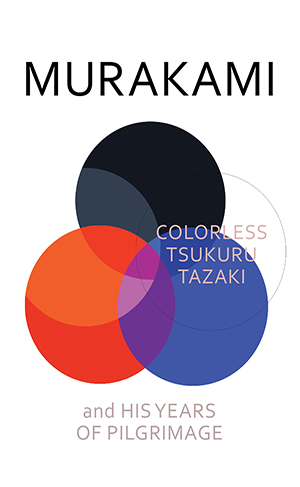Haruki Murakami is a rare creature: an author of literary fiction and hugely commercial, a Nobel Prize contender and a best seller. I was completely engrossed by his last book, 1Q84, a 1300 page, three volume magic realist ‘thriller’. Would his new novel Colourless Tsukuru Tazaki and His Years of Pilgrimage live up to my sky-high expectations? Not quite. It is a perfectly good book and if you are a long standing Murakami fan you would probably want to read it. If you are a Murakami virgin, I suggest you start with one of his other books, as I don’t think this is his best.
In Colourless Tsukuru Tazaki and His Years of Pilgrimage we meet railway station engineer and loner Tsukuru Tazaki whose tight knit group of high-school friends one day abandons him without explanation. Confused, shocked and hurt, Tsukuru retracts into a hermit-like existence. Many years later and on the verge of entering into a serious relationship, Tsukuru goes back to find out what really happened. And there are surprises in store for him, some shocking, others painfully banal.
Right from the start, Tsukuru feels he’s the odd one out. While his four friends have names to do with colours, Tsukuru’s name means ‘to build’. While they are all talented at something: sports, art or academics, Tsukuru has no passions to speak of other than his interest in railway stations. Amongst his friends, Tsukuru feels rather colourless and bland.
…there was not one single quality he possessed that was worth bragging about or showing off to others. At least that was how he viewed himself. Everything about him was middling, pallid, lacking in colour.
Tsukuru’s studies takes him away from his hometown to Tokyo and it’s on one of his visits back home that he is told he is no longer welcome as part of their group. His feeling of otherness dictates he’s the one to be excluded, Tsukuru reasons. Our hero dives into a serious depression and changes mentally as well as physically.
His face had changed as well. The mirror no longer showed a soft, decent-looking, though unthreatening and unfocused boy’s face. What stared out at him now was the face of a young man with cheekbones so prominent they looked as if they’d been chiselled by a trowel. There was a new light in his eyes, a glint he’d never seen before, a lonely, isolated light with limited range.
Tsukuru retracts into self-preservation mode, expecting to get dropped by people he gets close to, and lives a pretty isolated life until he meets the woman that might prove to be his saviour.
Murakami is interested in big ideas; in Colourless Tsukuru Tazaki it’s abandonment, self-perception as well as the risks inherent in living, forming friendships and relationships. He has an unmatched ability to condense and clarify what it is to be human and, as in many of his other books, we observe the world through the eyes of a young, somewhat lonely man.
Murakami is a world-class wordsmith. Rarely is the ‘less is more’ more true. His sentences are short and choice of vocabulary simple. My feelings about his writing can be summed up by a comment by one of his characters: ‘I like it, everything’s stripped to the bare essentials.’ For the language alone, Murakami’s novels are worth reading.
As with other Murakami books, dreams are intermingled with reality and you are never quite certain what is real and what is imagined. And we don’t always get the answer. We a left with some lose threads at the end. Does it matter? Not really. Murakami wants us to wonder.
Colourless Tsukuru Tazaki and His Years of Pilgrimage is not a bad book. It’s just that it lacks a bit of the intensity and magic of some of Murakami’s other books and feels, well, just a tiny bit colourless.
If you are still intrigued by Murakami, which are hope you are despite my lukewarm feelings for this book, Publisher’s Weekly has a very good article about ’10 Best Murakami Books’ written by a Murakami scholar.
Colourless Tsukuru Tazaki and His Years of Pilgrimage by Haruki Murakami is published by Harvill Secker, 304 pages.





